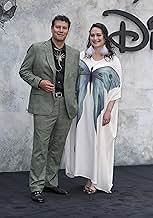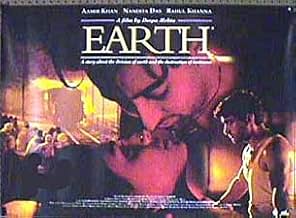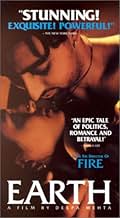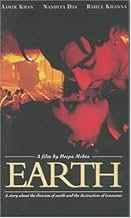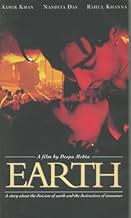Agrega una trama en tu idiomaIt's 1947 and the borderlines between India and Pakistan are being drawn. A young girl witnesses tragedy as her ayah (nanny) is caught between the love of two men and the rising tide of poli... Leer todoIt's 1947 and the borderlines between India and Pakistan are being drawn. A young girl witnesses tragedy as her ayah (nanny) is caught between the love of two men and the rising tide of political and religious violence.It's 1947 and the borderlines between India and Pakistan are being drawn. A young girl witnesses tragedy as her ayah (nanny) is caught between the love of two men and the rising tide of political and religious violence.
- Dirección
- Guionistas
- Elenco
- Premios
- 3 premios ganados y 2 nominaciones en total
- Hariya
- (as Raghuvir Yadav)
- …
- Butcher
- (as Pavan Malhotra)
- Dirección
- Guionistas
- Todo el elenco y el equipo
- Producción, taquilla y más en IMDbPro
Opiniones destacadas
I felt, this film mainly focuses on the character of Dil Navaz (brilliantly enacted by Aamir Khan) ... a person who turns from a cheerful, romantic and simple common man to a person who becomes violent and villanious in his hatred for a sect of people. The 1947 partition riots is an example of a social upheaval that can trigger such a change in a person. As the character says, we all have a lion encaged within us and the day the cage breaks open, God only can save us from the aftermath.
Aamir Khan is astonishing in his performance. He is gaining considerable mileage as a class actor ( a rarity in Hindi commercial film industry ) because of his recent pick of movies and definitely "Earth" marks a high point in his career graph. The different shades of emotion Dil Navaz undergoes through the film are effectively communicated through his face, articulation and body language. The climax scene is particularly memorable. Nandita Das and Rahul Khanna have given able support. The little girl Maia Sethna as "lenny" is also very promising. The direction has been very controlled and Deepa handles the events beautifully with excellent cinematographic support.
To sum it up, Earth offers an excellent viewing experience to all and makes the audience really "feel" for the victims ( both physical and mental ) of such events in World history as the India-Pakistan partition.
As an Indian-born American this film had an intense emotional impact on me, as it did with my best friends sitting to my right and left - a Muslim and a Sikh. It seems melodramatic but we sat in our seats, tears in our eyes, stunned.
One of the things I look forward to after every movie going experience is the inevitable discussion that follows. All three of us were silent for almost half an hour. It dawned on us that we could have been the group of friends who were so close at the beginning only to be divided by our demons in the name of religion at the end.
As an aspiring film-maker, I would like to congratulate Deepa Mehta for her courage and determination in presenting such amazing human stories. In an industry where Bollywood sachharine seems to prevail, it is reassuring to see a true artistic voice strike a lyrical chord with the world.
She makes me proud to be Indian first and foremost.
The film, based on the autobiographical novel "Cracking India" by Bapsi Sidhwa, concentrates on the effect the civil turmoil has on personal relationships. Somehow, politics brings out the worst in everyone; submerged resentments and trivial jealousies fuel shocking atrocities. Even innocent little Lenny manages to act badly, despite her "neutral" status.
Despite the presence of at least one "Bollywood" star (Aamir Khan) the director, Deepa Mehta, has not made a crowd-pleaser here. There are survivors, but no surviving heroes. The story unfolds first at a leisurely pace, gaining speed as independence day approaches and ends in a montage of mobs, destruction and violence. Every scene is beautifully composed and almost every part sensitively played. Maia Sethna as Lenny, Nandita Das as her beautiful young nanny Shasta , Rahul Khanna as Hasan, Shastas' lover and Aamir Khan as Dil Navaz the 'ice candy man" are all stand-outs. While not actually filmed in Lahore (the authorities there were not keen, it seems) the film evokes superbly a hot, ancient and troubled land. The whole style of the film is quite different from anything to emerge out of Hollywood and that alone makes it worth seeing.
It is suggested in the film that perhaps the villain here was that old standby, human nature. It does seem, though, that the British India administration (represented here only by one drunken official at a dinner party) and particularly the British government, had a lot to answer for. The twenty-five years or so leading up to independence were marked by the failure of successive conservative British governments to allow a truly responsible democracy to emerge in India when it was quite clear by the end of World War One that independence was inevitable. (The white Dominions on the other hand were practically pushed into independence.) Then, when the post-war Labour government decided to grant independence it did so with unseemly and disastrous haste. No, the chief villain was perfidious Albion, or rather British "muddling through". Here we get a beautiful, moving, elegiac account of the victims of bad colonial policy driven by racism and unenlightened self-interest.
As Parsees, India's "invisible" people, Lenny's wealthy family is supposedly sheltered from the growing conflict by an ever-fragile 'neutrality'. Lenny's naïvety is used quite effectively to endear her to the viewer. Her innocence makes the tragedy of Partition even more profound. The events occurring are incomprehensible to Lenny; her naïvety is best illustrated in the opening scene, in which she breaks a plate and, utterly perplexed, enquires "Can one break a country?" The story, though narrated by Lenny at beginning and end, does not always seem to be from her viewpoint and one doubts if she could accurately be described as the protagonist.
Lenny's Hindu ayah, or nanny, appears to be more of a focus. Shanta (Nandita Das) is beautiful, and is surrounded by a circle of male admirers, and, in particular, two Muslims suitors who vie for her affection. One is the poetic Dil Navaz (Aamir Khan), or as Lenny calls him, Ice Candy Man, and the other is a masseuse, Hassan (Rahul Khanna). Although it initially seems that it is with Dil Navaz that her affections lie, Hassan proves to be her true love, much to the surprise of the viewer. Whilst it is never really shown why Dil Navaz's courtship fails, the viewer could infer that it he lacked a certain gentlemanliness and that he possessed a certain darkness. What is clear is the love that Hassan has for Shanta; a love that is realised in a beautifully handled love-scene. Shanta is a woman for which he would convert to Hinduism and risk his life.
Mehta does not shy away from depicting the savagery of the conflict and the film possesses some extremely powerful moments. One in particular is the debilitating and horrifically gruesome 'de-limbing' of a man caught in the fury of a mob. Another, arguably most powerful, scene is the discovery of a trainload of massacre victims by Dil Navaz, among them his sisters, and sacks of severed breasts. The climax of the movie is a devastating illustration of the consequences of unrequited love. In the scene, we see the supposed protection of the Parsees crumble as an enraged Muslim mob arrives seeking Hindus and Sikhs. Shanta, a Hindu, is hidden in the house, as the mob questions workers who have converted from Hindu and Sikh to Muslim and Christian and then demands Shanta. Dil Navaz, played deftly by Aamir Khan, appears from the crowd, and appearing a "hero", deceives Lenny into revealing Shanta's whereabouts who is then dragged away screaming, and presumably murdered.
Based on the novel "Cracking India", by Bapsi Sidhwa (who co-adapted the script), the film translate to screen in a rich, flowing melodrama. It is strong in symbolism and the obvious motif of 'breaking' (plates, persons, dolls and relationships) works to keep the Partition in frame-of-mind. Mehta has created a sensual piece of dazzling colours that correspond with the moment in time in the first half it is joyful and organic, in the second it is dark and ominous. The accompanying soundtrack, by A.R. Rahman, is effective and appropriate. However, the film sits awkwardly betwixt the style of 'Bollywood' and that of Hollywood. It has, one could argue, obviously been made with a Western audience in mind, and consequently, does not set to be historically informative. Nevertheless, it is an effective piece that does not befuddle the viewer, and provides insight into how people were directly affected by the Partition, an event that still reverberates today.
(S. R. Watson, Flinders University, Adelaide)
The film has at its heart the year 1947 when India was given its independence from Great Britain and at the same time bifurcated into two countries - India and Pakistan. The story opens with a tranquil park picnic in Lahore where friends - Hindu, Muslim, Sikh, Parsee - while away the afternoon in camaraderie. Only slight overtones of edgy topics about religion mar the conversation until the topic focuses on the incipient split of the country into two countries. Each of the friends represents each of the religious sects and it is how these differences, at once unimportant to friendship, end up in separating the friends under the influence of the devastation of bloodshed that follows the division of the country and the displacement of millions of people, all under the guise of independence.
There is a strong love story, a committed crippled child who experiences all of the happiness and subsequent tragedy that is to follow and the story ends with some words of wisdom by the grown little girl reflecting on choices made, and other sidebars that maintain interest at every frame.
The acting is first rate from a beautiful cast and Mehta's direction makes this tale of change whir by the viewer. For those not educated in the differences of the four religious sects of Hindu, Parsee, Muslim, and Sikh the tale can become confusing: would that Mehta would have included a discussion about the film in an added feature the way she helped us understand the plight of widows in WATER. And the subtitles unfortunately do not translate the English spoken portions of the film, portions that while very important to the story are nearly indecipherable due to the accents of the characters speaking.
But these are minor quibbles in a film that pleads for repeated viewings, so beautiful is the movie and so very important is the message. Highly Recommended.
¿Sabías que…?
- TriviaAamir Khan's first negative role. He went on to receive much critical acclaim for his performance.
- Citas
Older Lenny: I was eight years old, living in Lahore in March of 1947, when the British Empire in lndia started to collapse. Along with talks of lndia's independence from Britain came rumblings about its division into two countries, Pakistan and lndia. Hindus, Muslims, and Sikhs who had lived together as one entity for centuries. suddenly started to clamor for pieces of lndia for themselves. The arbitrary line of division the British would draw to carve up lndia in August of 1947 would scar the Subcontinent forever.
- ConexionesFeatured in Women Make Film: A New Road Movie Through Cinema (2018)
Selecciones populares
- How long is Earth?Con tecnología de Alexa
Detalles
Taquilla
- Total en EE. UU. y Canadá
- USD 424,798
- Fin de semana de estreno en EE. UU. y Canadá
- USD 42,449
- 12 sep 1999
- Total a nivel mundial
- USD 424,798


